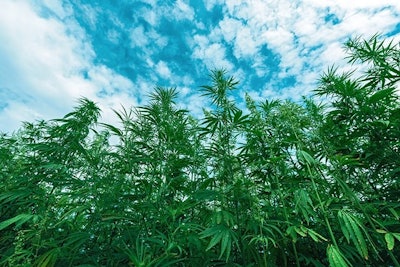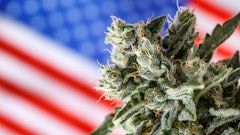
Editor's note: This story was updated Feb. 9 with a statement from the National Hemp Association.
New legislation on Capitol Hill aims to advance the U.S. hemp industry by addressing unresolved issues stemming from the implementation of the 2018 Farm Bill.
The Hemp Advancement Act of 2022, introduced Feb. 8 by Rep. Chellie Pingree (ME-01), is meant “to improve the 2018 Farm Bill’s hemp provisions and provide greater clarity and flexibility to hemp growers and processors,” according to a press release from Pingree’s office.
“The 2018 Farm Bill laid a legal pathway for hemp production but created overly complicated regulations and hardship for farmers and small businesses in the process,” Pingree said in a public statement. “I am introducing The Hemp Advancement Act of 2022 to eliminate unworkable testing requirements, set reasonable THC thresholds for producers and processors while protecting consumers, and end the discriminatory policy that bans people with drug convictions from growing legal hemp. My bill takes a commonsense, straightforward approach to correct these unintended implementation problems and works to make the hemp industry more profitable and more equitable. My bill also provides a clear path forward for this industry and will support a thriving hemp economy.”
According to the press release, the legislation would do the following:
- Raise the allowable THC threshold for hemp and in-process hemp extract to make the rules more workable for growers and processors while ensuring that final hemp products sold to consumers aren’t intoxicating.
- Remove the requirement that hemp testing occur in DEA-registered laboratories, which is a particular challenge in Maine where there currently aren’t any of these facilities.
- End the 10-year ban on people with drug-related felony convictions receiving a hemp license, which disproportionately excludes communities of color from participating in this emerging market.
“We are deeply grateful to Congresswoman Chellie Pingree for her strong leadership in spearheading this legislation on behalf of hemp growers, processors, and consumers nationwide,” the U.S. Hemp Roundtable said in a public statement. “The U.S. Hemp Roundtable is proud to have led a broad-based industry effort to propose the policies that underlie this legislation and to have worked closely with Rep. Pingree’s excellent staff throughout the drafting process to ensure our concerns were taken into consideration. Rep. Pingree’s vision and tenacity will make a significant and meaningful difference for our emerging industry.”
The National Hemp Association (NHA) is also in support of the bill overall.
"[On] the surface, the bill looks good. NHA likes that it raises the THC level to 1% and provides protection for 'in-process and in-transportation' materials," NHA Chairman Geoff Whaling told Hemp Grower in an email. "...The repeal of the controversial drug felon ban for anyone convicted of a felony drug-related charge from obtaining a hemp license is a key component of the NHA’s Social Justice Standing Committee mission, and [the bill] will give farmers and growers some comfort as it raises the legal THC limit to a higher threshold to avoid having to destroy what would today be considered a hot crop. And of importance to many in the hemp industry, [the bill] removes the DEA stipulation on registering laboratories."
Whaling cautioned, though, that certain aspects of the bill could have potential to stifle some areas of the hemp industry.
"Where there may be concern is the impact on smokable flower, which is a growing segment of the market," he said, adding that the bill contains language stating hemp is "not intended for sale to consumers."
"The devil is in the details, and we look forward to working with the congresswoman and her staff to advance this bill to passage," Whaling said.
The following organizations also support the Hemp Advancement Act of 2022, according to the press release:
- American Herbal Products Association
- Americans for Safe Access
- Association of Western Hemp Professionals
- Friends of Hemp
- Hemp Alliance of Tennessee
- Hemp Industries Association
- iHemp Michigan
- Realm of Caring Foundation, Inc.
- U.S. Hemp Authority
- U.S. Hemp Building Association
- Veterinary Cannabis Society
- Virginia Hemp Coalition
- Wisconsin Hemp Alliance
Regulatory uncertainty around hemp production, hemp processing and the sale of CBD products has created challenges for Maine’s hemp industry; while more than 2,000 acres of hemp were planted in the state in 2019, only 111 farmers received licenses to cultivate 211 acres hemp in 2020, according to the release from Pingree’s office.
Last year, Maine only licensed 49 farmers, who planted 67 total acres of hemp, according to a Portland Press Herald report.
“We’d love to help this crop take off and help our farmers diversify, but it hasn’t worked out like that,” Gary Fish, state horticulturist at the Maine Department of Agriculture, told the news outlet. “A lot of our big guys, the investors, they’ve left the market. We’ve seen some of our tiny growers do well.”
The situation in Maine has become so bleak that the state is worried that it will not be able to collect enough revenue in license fees—which average about $650 per farmer—to subsidize the $135,000 in annual costs required to run the hemp program, according the Portland Press Herald.
“Under the current regulatory regime established by the 2018 Farm Bill, hemp growers and processors often struggle to navigate THC testing and transportation requirements,” the U.S. Hemp Roundtable said in a public statement. “Meanwhile, consumers are often confused by products being marketed as hemp which are more appropriately sold in adult-use cannabis channels. The simple, straightforward provisions within The Hemp Advancement Act of 2022 would help make it easier and more profitable for U.S. farmers to grow hemp, while ensuring that consumers of hemp are protected against unsafe products. Further, aspiring hemp farmers who have made mistakes in their past but have paid time for their transgressions are barred from growing a safe and promising crop.”
Pingree has long been an advocate for the nascent U.S. hemp industry. Earlier this year, she joined her colleagues in the House in reintroducing the bipartisan Hemp and Hemp-Derived CBD Consumer Protection and Market Stabilization Act, which would provide a regulatory framework for the legal sale of hemp-derived CBD as a dietary supplement.
Pingree also led a bipartisan effort in 2019 to urge the U.S. Food and Drug Administration (FDA) to create a regulatory pathway for hemp-derived CBD as a food ingredient.
Hemp Grower Editor Theresa Bennett contributed to this report.
























